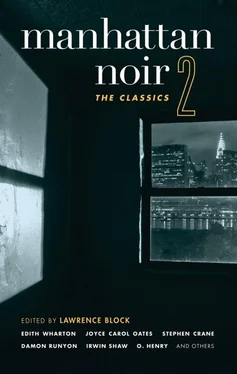“Thank you,” I said.
“My pleasure.”
“How do you feel?”
“Full. Brimming.” He raced ahead, spun, raced back, spun... “Overflowing,” he said.
“Functioning as you’re meant to gives you such joy?”
“Functioning, yes. As I’m meant to, that’s a non sequitur.”
“Everything has an intended function.”
“Bullshit.”
“The function is to die.”
“Puppycock.”
“Mountains erode. Organisms wither, drop and decay. Physically, we are eating ourselves. Spiritually, we are disintegrating. Psychologically, we are being gnawed from within. Everything is collapsing.”
Ahab chewed angrily at some irritation on his flank. “So?”
“So a priori there is no question of ultimate survival, and temporary survival can be obtained only through self-neutralization.”
“Temporary survival is total survival, triumph even, since in the grave nothing, including defeat, can be experienced. And survival is dependent on frameworks and structures.”
“None exist.”
“Right, so discover them.”
“Create them?”
“What can be created already exists; discover them. React. In a completely voluntary, and systematically arbitrary way. Reacting, you will act, which will cause reactions in the form of new actions. But it must be codified, all of it. And you must function within the system as if it were built upon categorical absolutes. Never question, never waver. You will have to do it, your species will have to do it. Perversely, you’ve forced yourselves to see the meaninglessness of your lives and values. So now you have no lives and values. You must rebuild.”
“Why, why should we? What’s the point?”
Ahab shrugged.
“It’s stupid,” I said.
“Someone suggested it wasn’t?”
I thought a few moments. “If, I mean just if someone wanted to do that, how would he go about it?”
“Plunge into it. Dramatically. Unequivocally. Your commitment has to be total.”
“And it works?”
“It works.”
“What about you?”
“I told you. I’m an atavism. Old primal race memories come to a head in me sometimes.”
“Then it’s not perfect.”
“Put it this way. Out of uncountable organisms over millions of years there have been only a few minor deviations. That’s not bad. Or not good, depending on your point of view.”
“I don’t have one.”
“That’s what we’ve been talking about.”
I sat up all that night looking out and down through my window at a street light and at the few people who passed hurriedly beneath it. In the morning I washed my face. I took Ahab to the park again. He made no mention of yesterday’s conversation. He made no mention of anything. He frolicked, rolled and burrowed in the rotten snow, delighted with this unexpected trip.
While he concentrated on digging a stick from under the snow several yards away I unzippered my jacket and closed my hand around the Luger jammed in my waistband. The Luger is a 9 millimeter automatic handgun with a parabellum action. Mine was manufactured in 1918 by the Deutsche Waffenund Munitionsfabriken and is marked with their monogram, a flourished DWM . Its serial number is 4731 and all its parts are original, except for the clip which bears the number 6554. It is an excellent weapon — compact, powerful, accurate and extremely well balanced. Often you will hear that Lugers are unreliable, that they jam frequently. This is not true. When jamming does occur it is invariably due to poor quality ammunition. American shells are not to be depended upon. 9 millimeter is a sporting caliber in the United States, not military, and the powder charge is too weak to keep the weapon working at maximum efficiency. Foreign military loads are easily obtainable. Belgian, Canadian, British or Israeli cartridges are all quite acceptable.
I laid my finger alongside the trigger guard. The metal was only a little chilly. The clip, which holds eight rounds, was already in place. I snapped the first shell into the chamber and flicked the safety off. I curled my finger lightly around the trigger and took aim.
The first shot broke Ahab’s right foreleg at the middle joint. He collapsed heavily. The second shot missed. The third passed high through the rear of his body, but did not break the spine. With difficulty and in obvious pain he struggled to his feet and limped toward me on three legs. “Don’t,” he called. “Oh please don’t.” I fired again. He fell, but continued squirming forward. “Please,” he said, “I love you. Don’t.” His blood was trickling and spraying bright red onto the dirty gray snow. I kept firing. “Please, I love you. I love you, I love you.” The seventh round split his skull. He spasmed and lay still, his broken leg bent beneath him.
I ejected the last round. It broke through the crust of rotten ice and disappeared, unspent. I went home.
It is summer now. Voraciously, I am eating life.
He intended this.
This is what he intended.
He did.
The interceptor
by Barry N. Malzberg
Death wore five faces that grim night. Could I pierce those grinning, evil masks and spot the real murderer?
Upper West Side
(Originally published in 1972)
He has been in the hotel room for a long time. No pleasure that but he thinks he has the crime figured out at last. It must have been his wife.
Everything, everything points to her. She must have killed Robinson in temper; then, when the placement of the securities next to the corpse would have tied the murder to her, turned the thing around and implicated him with that phone call which brought him to the scene just three minutes ahead of the police.
“Come over,” she said. “Something really terrible has happened; I appeal to you” and linked to her in the end, unable to understand what was going on he had come and had nearly been apprehended.
If he had not run immediately — but no sense in thinking about that now. He had gotten away from the police, just barely, and now at last he had solved the mystery. No time for speculation. No need for it either.
The motives were clear. Robinson and his wife must have been having an affair, had carried it on under him for a long time, his business partner and wife, and Robinson, bored, had been looking for a way out. Wryly he thinks that he could have warned Robinson about entrapment if only the man had been frank with him. In fact, regardless of consequences, Robinson might well have broken off the relationship if only given a little more time. And she could not bear to see it end that way, being that kind of a woman.
Yes, that must be it. He has nailed it to the ground. He lights another cigarette, looks around the room, paces to the window and looks at 72nd Street three floors below him, addicts milling in front of the hotel. He had been smart to have selected a location like this to be hidden although the circumstances were not of the best. If nothing else, living in this hotel for some weeks has made him socially conscious.
Perhaps it was not merely a crime of passion, though. His wife must have known that sooner or later Robinson would let slip news of the affair and the divorce would have been shattering. At all costs the woman believed in appearances. She would not even have a bedroom fight unless she was made up for it.
He sighs, walks away from the window. Relief overtakes him. It is good to know that he has the matter straightened out for himself at last and not a moment too soon. The police are closing in; even with the help of the inspector he could not remain in flight from the authorities forever. And to be apprehended in a hotel like this—
Читать дальше












